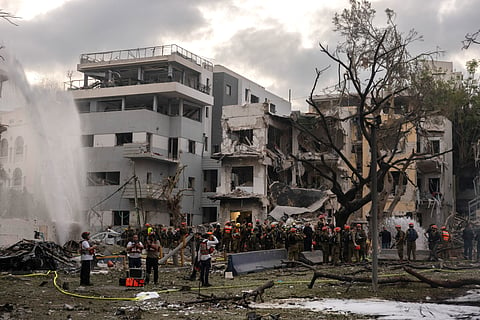Kenneth Mokgatlhe: Israel wages a fight to survive
Key topics:
Iran funds Hamas, Hezbollah, and Houthis to attack and destabilise Israel.
Israel sees Iran’s nuclear ambitions as an existential threat.
South Africa aligns with Iran, ignoring its role in regional chaos.
Sign up for your early morning brew of the BizNews Insider to keep you up to speed with the content that matters. The newsletter will land in your inbox at 5:30am weekdays. Register here.
Support South Africa’s bastion of independent journalism, offering balanced insights on investments, business, and the political economy, by joining BizNews Premium. Register here.
If you prefer WhatsApp for updates, sign up to the BizNews channel here.
The auditorium doors will open for BNIC#2 on 10 September 2025 in Hermanus. For more information and tickets, click here.
By Kenneth Mokgatlhe*
Since its inception in 1948, the State of Israel has faced numerous wars with its Arab neighbours, who initially did not believe that it had the right to exist. While most of these neighbours— including Egypt, Jordan, and Saudi Arabia—have since changed their stance toward the world’s only Jewish state, the Islamic Republic of Iran has made it its central mission to annihilate Israel and the Jewish people.
Before the Iranian Revolution in 1979, Iran and Israel maintained cordial relations. However, once Ayatollah Khomeini came to power and established the Islamic Republic, Iran aggressively adopted policies aimed at the destruction of Israel. Iran has since become the main sponsor and enabler of terrorism in the Middle East, using its state power to support violent sub-state groups that spread terror across the globe. This includes creating and funding proxy militants such as Hamas in Gaza, the Houthis in Yemen, and Hezbollah in Lebanon. The sole intention of these groups is to wipe Israel off the map.
Furthermore, Iran has consistently supported violent groups in efforts to sabotage Israeli-Palestinian and Israeli-Syrian peace talks. The Iranian regime should be held responsible and accountable for much of the chaos unfolding across the Middle East. It has indoctrinated many into believing that negotiation equates to betrayal of the Muslim cause, while offering no practical solutions to the Israel-Palestine impasse, other than arming Hamas, Hezbollah, and the Houthis to foment further instability. Their infamous slogan remains: “Death to America, Death to Israel.”
For this reason, Israel cannot allow Iran to obtain a nuclear weapon—it would pose a grave danger not only to Israelis but to many other nations. If Iran was willing to aid and enable Hamas in its brutal invasion of Israel, resulting in the murder of over 1,200 people, then it is clear that the threat they pose is real. Their declarations of “Death to Israel” are not mere rhetoric. It is therefore not surprising that Israel views Iran as an existential threat. Iran’s hostility—whether directly or through proxies—has instilled fear, distrust, and despair among Israelis, who have been subjected to recurring violence from childhood. For them, the terror never ends.
Read more:
The significance of Israel’s normalisation deals—concluded with countries such as the United Arab Emirates (UAE), Bahrain, Sudan, and Morocco—posed a serious threat to Iran’s influence in the region. Iran worked to disrupt the potential normalisation deal between Israel and Saudi Arabia, believing it would further isolate the Islamic Republic from other Muslim-majority countries that are striving to move forward as progressive nations. Egypt and Jordan had already normalised relations with Israel in the 1970s and 1990s, respectively.
Longtime Israeli Prime Minister Benjamin Netanyahu has devoted much of his political career to warning the world about the threat Iran poses—not just to Israel, but to global peace. However, many world leaders have disregarded his warnings, failing to take seriously his calls for action against Iran’s nuclear ambitions.
Where does South Africa come into all this? Judging by the official statements of South Africa’s Department of International Relations and Cooperation, it is clear that the country supports and aligns itself with Iran, a regime at the heart of the Middle East’s ongoing instability. If South Africa is unable to offer constructive intervention or mediate between warring groups, it would do better to refrain from taking sides, especially the wrong side of history, by supporting a state that sponsors terrorism.
South Africa’s unhealthy obsession with Israel blinds it to the existential threat that Iran poses, as well as the broader destabilisation it causes in the region. South Africa should only intervene in the Israeli-Palestinian conflict if it is prepared to contribute positively—through initiatives that promote peace, stability, and security—for the benefit of all nations in the region.
*Kenneth Mokgatlhe is a political analyst and consultant.

